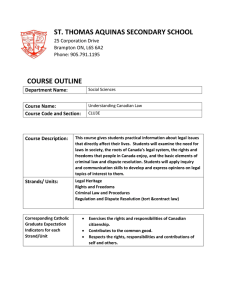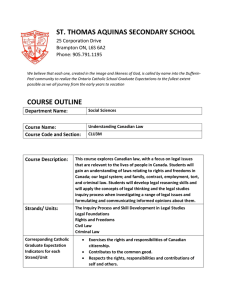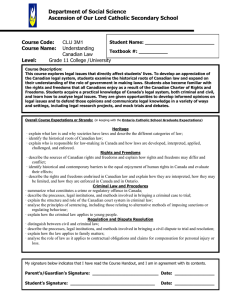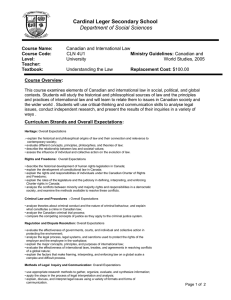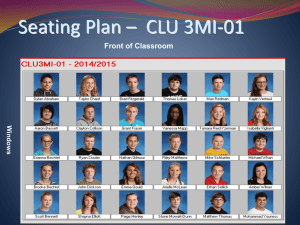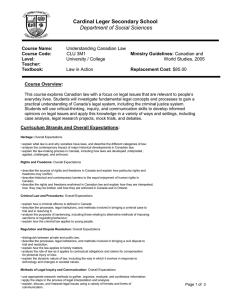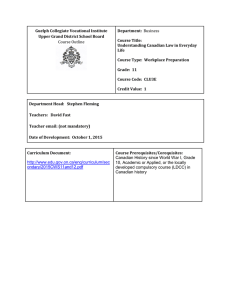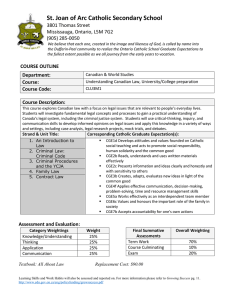Department of Social Science Ascension of Our Lord Catholic Secondary School
advertisement
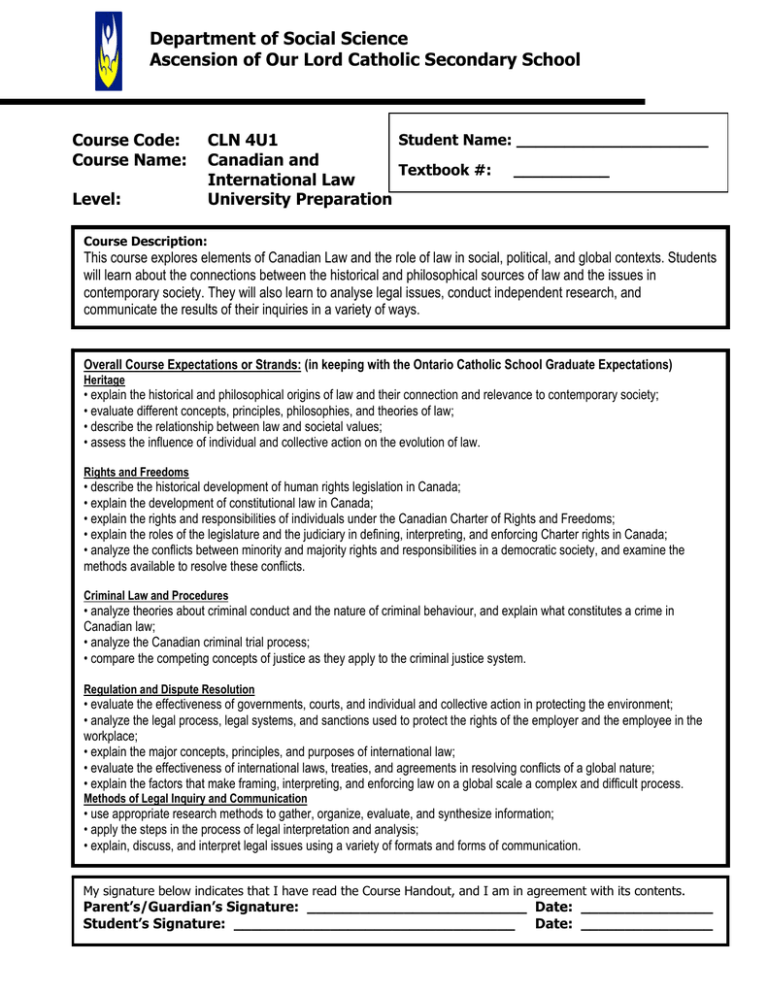
Department of Social Science Ascension of Our Lord Catholic Secondary School Course Code: Course Name: Level: Student Name: ____________________ CLN 4U1 Canadian and Textbook #: __________ International Law University Preparation Course Description: This course explores elements of Canadian Law and the role of law in social, political, and global contexts. Students will learn about the connections between the historical and philosophical sources of law and the issues in contemporary society. They will also learn to analyse legal issues, conduct independent research, and communicate the results of their inquiries in a variety of ways. Overall Course Expectations or Strands: (in keeping with the Ontario Catholic School Graduate Expectations) Heritage • explain the historical and philosophical origins of law and their connection and relevance to contemporary society; • evaluate different concepts, principles, philosophies, and theories of law; • describe the relationship between law and societal values; • assess the influence of individual and collective action on the evolution of law. Rights and Freedoms • describe the historical development of human rights legislation in Canada; • explain the development of constitutional law in Canada; • explain the rights and responsibilities of individuals under the Canadian Charter of Rights and Freedoms; • explain the roles of the legislature and the judiciary in defining, interpreting, and enforcing Charter rights in Canada; • analyze the conflicts between minority and majority rights and responsibilities in a democratic society, and examine the methods available to resolve these conflicts. Criminal Law and Procedures • analyze theories about criminal conduct and the nature of criminal behaviour, and explain what constitutes a crime in Canadian law; • analyze the Canadian criminal trial process; • compare the competing concepts of justice as they apply to the criminal justice system. Regulation and Dispute Resolution • evaluate the effectiveness of governments, courts, and individual and collective action in protecting the environment; • analyze the legal process, legal systems, and sanctions used to protect the rights of the employer and the employee in the workplace; • explain the major concepts, principles, and purposes of international law; • evaluate the effectiveness of international laws, treaties, and agreements in resolving conflicts of a global nature; • explain the factors that make framing, interpreting, and enforcing law on a global scale a complex and difficult process. Methods of Legal Inquiry and Communication • use appropriate research methods to gather, organize, evaluate, and synthesize information; • apply the steps in the process of legal interpretation and analysis; • explain, discuss, and interpret legal issues using a variety of formats and forms of communication. My signature below indicates that I have read the Course Handout, and I am in agreement with its contents. Parent’s/Guardian’s Signature: _________________________ Date: _______________ Student’s Signature: ________________________________ Date: _______________ Resources: Course Timeline: Unit 1 – Heritage Unit 2 – Rights and Freedoms Unit 3 – Criminal Law and Procedures Unit 4 – Regulation and Dispute Resolution Unit 5 – Methods of Legal Inquiry 25 hours 20 hours 30 hours 25 hours 10 hours The course will use a resource which will be distributed to students during the first week of the course. The text and all other resources assigned to each student are the responsibility of the student. Resource for this course includes: Dimensions of Law - Textbook Students must provide: Notebook, paper, pen, pencil All timelines as stated are approximate. Any damage incurred will result in payment for replacement. Replacement cost is $100 Evaluation Policies 1. Student marks will be determined by evaluating process & product according to 4 categories (see below) & 4 levels of the Achievement Chart as found in the Ministry Policy document for Canadian and World Studies. Evaluation Structure: Knowledge/Understanding 25% Application 25% Communication 25% Thinking 25% Term Evaluations = 60% - of the final mark + Research Essay - 10% of final mark Final Evaluation = 30% - Final Exam. 2. Feedback will also be provided for student learning skills. Independent work, collaboration, organization, responsibility, self-regulation and initiative are assessed apart from student achievement in the four categories outlined above and will conform to the coding: E – Excellent G – Good S – Satisfactory N - Needs Improvement 3. Assignments submitted after the due date established by the teacher will receive a penalty in accord with our Board’s Assessment & Evaluation Policy Document as outlined in the student agenda. 4. Should a student miss an evaluation due to a legitimate absence, in accord with our Board A&E Policy Document, the student and teacher will make arrangements to address the missed evaluation in a timely manner. In the cases of extended vacation or prolonged absence, consultation with the appropriate administrator is required. 5. In the event that the student does not make up the missed evaluation(s), a zero may be assigned. If it is determined that the evaluation(s) has/have been missed as a result of a skip/truancy or has/have been plagiarized, a zero may be assigned. 6. For all other cases of absence and/or missed evaluations (including absence during the final examination period), please refer to our Board A&E Policy as outlined in the student agenda. 7. Efforts will be made to meet the individual learning needs of students to promote student success with respect to meeting the expectations of this course. May God bless your efforts this semester!
